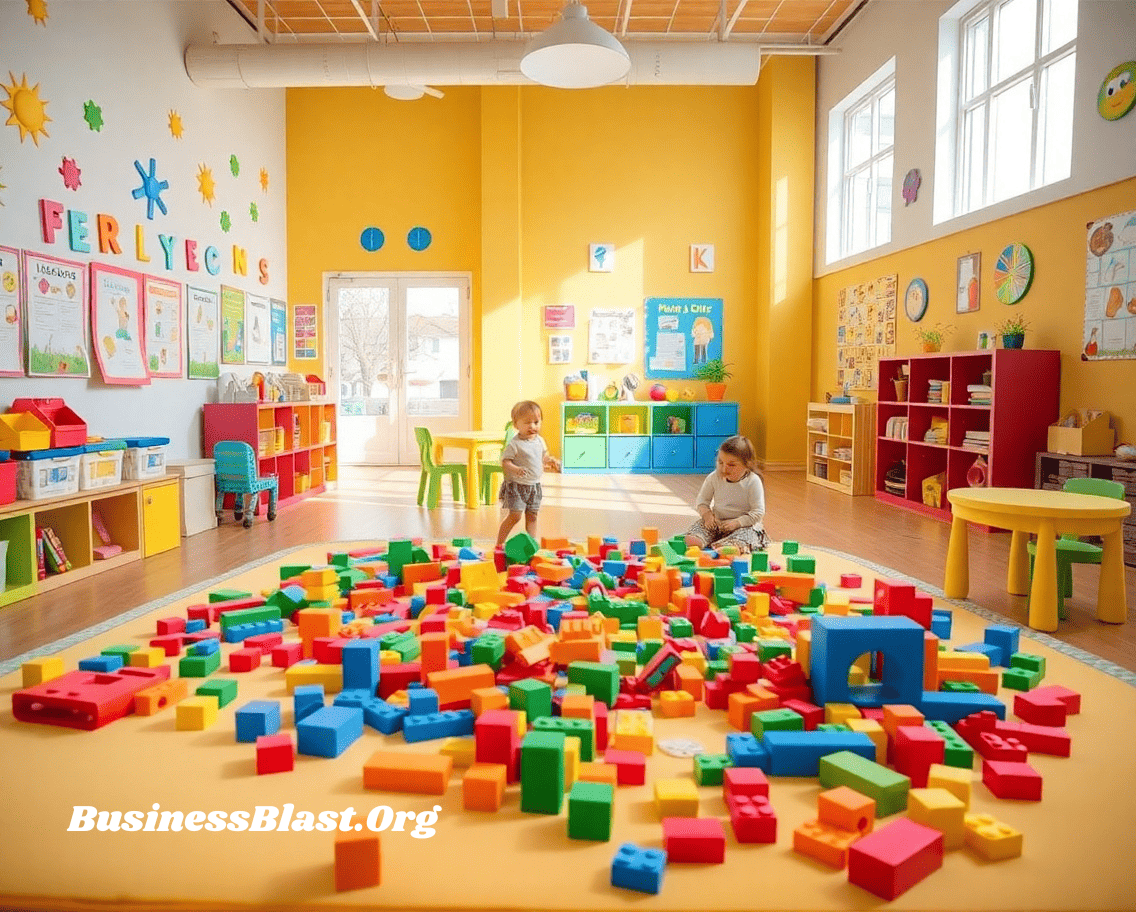Early childhood education is essential in fostering a child’s cognitive, social, and emotional growth. As educational frameworks continue to evolve, more innovative approaches are emerging to provide children with a well-rounded foundation. One such groundbreaking initiative is Tinel Building Blocks Preschool, a program that uses building blocks as a central educational tool to foster creativity, critical thinking, and problem-solving skills. This article delves into the philosophy, curriculum, benefits, and unique features of Tinel Early Learning Center, offering a comprehensive understanding of how it is revolutionizing early childhood education.
What is Tinel Building Blocks Preschool?
Tinel Early Learning Center is an innovative early childhood education program that incorporates the use of building blocks into the core of its curriculum. Designed for children aged 3 to 6 years, this preschool model combines play-based learning with structured, goal-oriented activities to nurture a child’s development. The central idea behind this approach is that children learn best when they are actively engaged in hands-on activities that stimulate their natural curiosity and promote cognitive, emotional, and social growth.
Building blocks, a classic educational tool, have been a staple in early childhood development for decades, but Tinel Early Learning Center takes it a step further by strategically incorporating these blocks into various educational themes and learning objectives. The program blends creativity with academic concepts, offering a dynamic and fun environment that encourages children to build, explore, and grow.
The Philosophy Behind Tinel Early Learning Center
The core philosophy of Tinel Early Learning Center revolves around the idea of learning through play. This approach is rooted in the belief that early childhood education should focus not just on academics but on nurturing a child’s emotional and social growth as well. At Tinel Early Learning Center, play is seen as the essential mechanism through which children develop essential life skills such as critical thinking, communication, collaboration, and emotional regulation.
By using building blocks as an interactive tool, the preschool taps into various aspects of a child’s development, from fine motor skills and cognitive reasoning to creativity and social interaction. Tinel Building Blocks Preschool acknowledges that children at this age are naturally curious and learn best through sensory experiences, allowing them to explore their environment in a way that traditional teaching methods cannot offer.
Why Are Building Blocks Crucial in Preschool Education?
Building blocks are more than just toys; they are powerful educational tools that contribute to a child’s development in numerous ways. Here’s how:
Cognitive Development
One of the key benefits of using building blocks in early childhood education is their impact on cognitive development. As children build with blocks, they engage in critical thinking and problem-solving. They experiment with shapes, sizes, and structures, which enhances their spatial awareness and understanding of basic mathematical concepts. Activities like stacking, sorting, and balancing teach children about symmetry, gravity, and cause-and-effect relationships.
In addition to these cognitive skills, building blocks also promote creativity. Children can use blocks to create various structures, from towers and houses to bridges and castles, helping them explore their imagination while reinforcing concepts like design and construction.
Social and Emotional Development
Building blocks also play a significant role in a child’s social and emotional development. As children interact with their peers during block play, they learn vital social skills such as sharing, cooperation, and conflict resolution. For instance, when two or more children collaborate on a building project, they must communicate effectively to divide tasks, share resources, and resolve disagreements. These interactions help them develop empathy, patience, and teamwork, which are essential for successful socialization.
Furthermore, building blocks provide opportunities for children to experience both success and failure in a controlled environment. This fosters emotional resilience as children learn to cope with challenges like a collapsed tower or a failed structure, encouraging perseverance and a growth mindset.
Fine Motor Skills
Manipulating building blocks also enhances a child’s fine motor skills. The precise movements required to stack, align, and arrange blocks improve hand-eye coordination, finger dexterity, and overall motor control. These skills are crucial for tasks like writing, using utensils, and engaging in other hands-on activities that require manual precision.
How Tinel Building Blocks Preschool Integrates Learning Objectives
At Tinel Early Learning Center, every activity is designed with specific learning objectives in mind. The program is meticulously structured to ensure that children are not only having fun but also acquiring essential academic skills that will serve as the foundation for their future learning experiences.
Academic Foundations Through Play
Tinel Building Blocks Preschool integrates core academic subjects into the block play experience, making learning both enjoyable and effective. Here’s how:
- Mathematics Skills: Through activities like sorting blocks by color, shape, or size, children develop early math skills. By counting blocks and arranging them in patterns, children begin to understand basic arithmetic and geometry concepts.
- Language Development: Block play also offers ample opportunities for language development. As children narrate stories about their block structures, they practice their communication skills, expanding their vocabulary and learning how to express their ideas clearly. Teachers may also engage in storytelling activities where children build scenes that correspond to a story, enhancing both their language comprehension and creativity.
- Science and Engineering: As children experiment with building structures, they learn about scientific concepts such as balance, gravity, and stability. For example, when a child constructs a tower, they must figure out how to distribute the weight evenly to prevent it from toppling over. This hands-on experience helps children grasp fundamental principles of physics and engineering in an age-appropriate manner.
A Focus on Holistic Development
While academic learning is a central focus, Tinel Early Learning Center also prioritizes holistic child development. The curriculum emphasizes social-emotional growth, physical development, and creative expression, ensuring that children are well-rounded and prepared for future academic and life challenges.
- Physical Development: Block play encourages children to engage in physical activities, from building large structures that require movement and coordination to manipulating small blocks that help refine fine motor skills. These activities contribute to physical growth and help children develop coordination and strength.
- Creative Expression: The open-ended nature of building blocks allows children to express their creativity and imagination freely. Whether constructing a model of a dream house or building a representation of their favorite animal, children have the freedom to create and explore their ideas in a tangible form.
The Curriculum and Methodology of Tinel Early Learning Center
The curriculum at Tinel Building Blocks Preschool is carefully crafted to be both structured and flexible, allowing for a well-rounded learning experience. The framework incorporates various themes and learning objectives, ensuring that children are engaged while developing critical skills.
A Structured Yet Flexible Framework
The curriculum follows a structured framework, with each lesson designed around specific themes such as “Exploring Shapes,” “Building a Community,” or “Constructing a Bridge.” These themes guide activities while leaving room for children’s creativity to flourish. For example, a “Building a Community” theme might involve constructing a model of a neighborhood, allowing children to explore different types of buildings, traffic patterns, and public spaces.
Aligning with International Educational Standards
Tinel Early Learning Center aligns with international early childhood education standards, such as the Common Core State Standards in the U.S. and other global educational benchmarks. This ensures that the program provides a high-quality educational experience that prepares children for kindergarten and beyond.
Integration of STEM Learning
The program seamlessly integrates STEM (Science, Technology, Engineering, and Mathematics) concepts into everyday play. Children engage in activities that introduce engineering principles, such as designing stable structures with blocks or experimenting with balance and gravity. These activities foster an early love for STEM subjects and lay the foundation for more advanced learning in later years.
How Tinel Building Blocks Preschool Stands Out
Tinel Early Learning Center distinguishes itself from traditional early childhood programs in several key ways:
Innovative Use of Technology
While building blocks are the cornerstone of the program, technology is also incorporated to enhance learning. Interactive apps and digital tools complement block play by allowing children to visualize their designs in a digital format or solve logic puzzles inspired by their block creations. This integration of technology provides children with a modern learning experience that supports their cognitive development.
Adaptability for Home and School
Tinel Building Blocks Preschool is not limit to the classroom. The program’s activities can easily be adapt for home use, with parents receiving guidance on how to incorporate block-based learning into daily routines. This makes it a versatile tool for parents who want to continue their child’s education outside of school.
Inclusive and Culturally Responsive
The program is inclusive and culturally responsive, recognizing the importance of diversity in early childhood education. Activities are designed to engage children from different cultural backgrounds, ensuring that every child feels represented and valued.
The Benefits of Tinel Early Learning Center for Stakeholders
For Educators
Tinel Early Learning Center simplifies lesson planning by providing a clear and structured curriculum filled with engaging, hands-on activities. Teachers can adapt the curriculum to suit different learning environments and class sizes, ensuring that all children benefit from the program.
For Parents
Parents appreciate the emphasis on interactive learning, which keeps children engaged while helping them acquire essential skills. The ability to extend learning at home further strengthens the parent-child bond and supports academic growth.
For Children
Ultimately, the biggest beneficiaries of Tinel Building Blocks Preschool are the children themselves. By engaging in creative block play, children develop foundational skills in math, science, language, and social-emotional learning. The program nurtures curiosity, fosters resilience, and cultivates a love for lifelong learning.
Conclusion
Tinel Early Learning Center represents a revolutionary approach to early childhood education, where learning and play are seamlessly intertwine to foster the growth of young minds. By integrating building blocks into a structured yet flexible curriculum, this program ensures that children develop essential cognitive, social, and emotional skills in an engaging and enjoyable way. The combination of academic rigor, creativity, and hands-on learning experiences makes Tinel Building Blocks Preschool a trailblazer in early childhood education.
Ziggylock Pistols Homestucks A Creative Phenomenon in Fandom Craftsmanship and Culture



